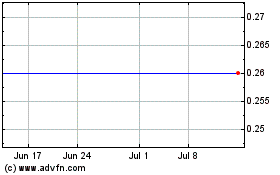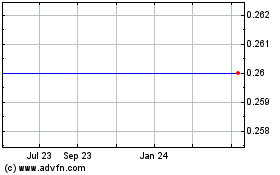FCC Opens Probe Into 'Special Access' Market
October 16 2015 - 5:28PM
Dow Jones News
By Ryan Knutson
For at least a decade, telecom companies like Sprint Corp., XO
Communications LLC and Level 3 Communications Inc. have complained
that large phone companies like AT&T Inc. and Verizon
Communications Inc. have abused their market power in an obscure
but important part of the telecommunications market.
On Friday, the Federal Communications Commission said it was
opening an investigation into the tactics of AT&T and Verizon,
as well as Frontier Communications Corp. and CenturyLink Inc.
The investigation centers around what's known as special access,
which is the bulk data connections businesses buy to connect things
like retail outlets, ATMs and cell towers.
AT&T, Verizon, CenturyLink and Frontier dominate the special
access market because they effectively control the wires that were
built by the legacy AT&T monopoly, which was broken up by the
government in 1984. The FCC estimates the size of the market under
investigation is roughly $20 billion.
The smaller companies accuse the carriers of locking up the
market by forcing them to sign volume commitments and by charging
monopoly prices and early termination fees. Level 3, for instance,
says Verizon requires it to buy 90% of its special access from
Verizon in some markets to avoid substantial fees. Since there
aren't enough alternative providers to supply Level 3 with all of
its special access needs, it has no choice but to buy from
Verizon.
Sprint, which uses the special access to connect its cell
towers, says it had to pay huge termination fees to the larger
carriers when it switched many of its 38,000 cell towers to
alternative providers.
AT&T, Verizon and the other large carriers deny the
allegations and say the market is competitive.
"The terms the commission is reviewing are commonplace in most
commercial contracts," Frank Simone, AT&T vice president of
federal regulatory, said in a statement.
The FCC's investigation will take at least a few months, an
agency official said. Any action the agency takes as a result of
the findings will require approval from a majority of the FCC's
five commissioners. One possible outcome is the carriers being
forced to modify the terms of their contracts.
The 1996 Telecommunications Act gives the FCC authority to
police competitive behavior in the telecom market, but the agency's
jurisdiction over these types of contracts primarily only covers
older technologies. AT&T, Verizon and other carriers have
invested in newer network technologies that aren't subject to FCC
oversight in this way.
The investigation announced Friday is separate from an FCC
effort to collect data about the special access market as it
considers a broader set of new regulations.
Write to Ryan Knutson at ryan.knutson@wsj.com
Subscribe to WSJ: http://online.wsj.com?mod=djnwires
(END) Dow Jones Newswires
October 16, 2015 17:13 ET (21:13 GMT)
Copyright (c) 2015 Dow Jones & Company, Inc.
Frontier Communications (NASDAQ:FTR)
Historical Stock Chart
From Mar 2024 to Apr 2024

Frontier Communications (NASDAQ:FTR)
Historical Stock Chart
From Apr 2023 to Apr 2024
